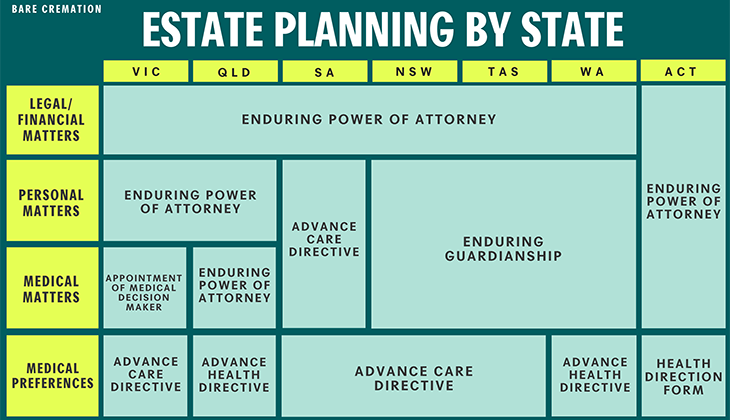About 80 per cent of older people who are admitted to a hospital emergency department don’t have an advance healthcare plan in place.
That’s concerning.
An advance health plan, sometimes known as an advance care plan or living will, is a legal estate planning document allowing you to outline your wishes and preferences when it comes to future medical care and end-of-life treatment. It is a tool to guide your medical treatment decision-maker and medical practitioners if you can no longer consent or make decisions yourself.
Depending on the state in which you reside, the document may have a slightly different name and the decision-making aspect can vary.
For example, an Advance Care Directive exists in Victoria, NSW, South Australia and Tasmania; whereas an Advance Health Directive exists in Queensland and Western Australia; but a Health Direction exists in the ACT; and an Advanced Personal Plan in the Northern Territory.
An advance health plan outlines the details of what is important to you, including values and preferred outcomes. It can also include the treatments and care you would like or would refuse if you have a life-threatening illness or injury.
In most states, an advance health plan will outline your medical preferences, but not provide legal authority for someone to make medical decisions on your behalf.
For that reason, you should make this directive in tandem with the relevant medical authority document for your state – for example, in Victoria it is an Appointment of Medical Decision Maker. If both an Advance Care Directive and an Appointment of Medical Decision Maker are in place, the medical decision-maker is then bound by the directive.
Can you make an advance health plan at any time?
It can be useful to have the appropriate authorisation in place if you become unwell later on or lose the ability to make medical decisions.
You should make an advance health plan if you have an ongoing medical condition, have an upcoming medical procedure or surgery, or if you are elderly or nearing your end of life.
Advance Care Planning Australia recommends advance healthcare conversations should begin when a person is medically stable and comfortable. It’s important to talk about your wishes for end of life in the presence of your substitute decision-maker (or decision-makers), family, friends and carer if you have one.
Anyone aged 18 or over can make an advance health plan at any time, as long as they have ‘full legal capacity’ to do so. In other words, they must know and understand what’s involved with appointing a power of attorney and the implications of their decision.
Legal and financial decision-maker
Another important estate planning document to make is an Enduring Power of Attorney (EPOA) document, which authorises someone to make decisions on your behalf relating to legal, financial and personal matters.
It can be useful to have an EPOA if you become unwell or lose the ability to make decisions or manage your financial affairs.
Most commonly, an EPOA is used to pay bills; sign documents; manage, sell or buy property; or make decisions about where the person might live.
You can specify when and how your attorney can act for certain decisions, and be as specific as you wish. Consider when you want them to start managing your affairs: will it be before you lose mental capacity, or after? And will it be only for some decisions, or all of them? For example, only when you are overseas; before you reach a certain age; or for specific conditions.
Is an EPOA called something else?
An EPOA deals with legal and financial decision-making in all Australian states and territories except the Northern Territory. However, depending on which state you reside in, personal and medical decisions will be dealt with differently and the legal document may be called something else:
- In Queensland and the ACT, all decisions (legal, financial, personal and medical) are made under an EPOA.
- In NSW, Tasmania and Western Australia, legal and financial decisions are made under an EPOA, however personal and medical decisions are made under an Enduring Guardian.
- In Victoria, legal, financial and personal decisions are made under an EPOA, however medical decisions come under an Appointment of Medical Decision Maker.
- In South Australia, legal and financial decisions are made under an EPOA, however personal and medical decisions are made under an Advance Care Directive.
- In the Northern Territory, an EPOA was replaced by an Advanced Personal Plan in 2014, which sets out a plan for future health, financial and life choices. However, a general power of attorney still exists to give someone full legal right to act on your behalf.

Who should I appoint as my decision-maker?
Your designated attorney or medical decision maker can be any adult family member or close friend, or someone else you trust, so consider who will be the most appropriate person to make decisions on your behalf. You can even appoint more than one person to either make decisions alone or together.
What happens if I don’t have an advance health plan?
If you have strong values or beliefs – either consenting to, or refusing a particular medical treatment – outlining these in an advance health directive means medical professionals cannot override these wishes.
If your wishes for life-changing care are not known, doctors may use aggressive treatments that you might not have wanted.
If you don’t have a power of attorney document in place and you lose capacity to make decisions about legal, financial, or personal matters, a family member may have to make an application to the relevant state tribunal (for example, VCAT in Victoria).
The order appoints a guardian on the person’s behalf and gives them the same powers as those that would have been given in a power of attorney document. Having to obtain this order when it is needed can slow down the process if important matters need to be dealt with quickly.
As these types of applications are proceedings with the tribunal, they can be subject to disputes. So, if there are disagreements within the family, particularly at a time when decisions need to be made quickly and often under pressure, then disputes may arise by another person contesting the application.
The tribunal then needs to decide who is best to make decisions, or alternatively they would appoint the relevant Public Trustees to act, which can be very costly and inefficient.
Having to apply for an order often comes at a time when family members are dealing with the deteriorating health of a loved one, so the process can add additional stress at an already emotional time.
To save future hassle, it’s always better to have these important estate planning documents in place earlier, before they are needed, rather than later.
Another reason you might need to have these documents in place is if you are entering a retirement village or aged care facility. It is becoming more common to be asked for these types of documents before taking up residence, even if there are no signs of reduced medical or mental health.
Do I need to register my advance health directive?
Your advance health directive doesn’t need to be registered anywhere, however the document must be signed and witnessed for it to become legally binding. The requirement differs in each state, so you should seek legal advice to ensure it is done correctly. Estate planning experts, such as those at Bare Law, can help you prepare important documents like these and answer questions about wills and estates.
Once finalised, the signed advance health directive may be uploaded to your My Health Record. If you are in Victoria and have also made an Appointment of Medical Decision Maker, this document can be uploaded there too.
Make sure your next of kin, family and relevant health practitioners or health services are aware of your advance healthcare plan and store the documents in a safe and accessible place, generally with your Last Will and Testament. Just be sure not to staple it or attach these documents to the will in any way, which can invalidate it.
Disclaimer: this article is not legal advice. You should speak with your solicitor or accountant for specific advice on your personal or financial situation.
Cale Donovan is the co-founder of Bare Cremation – the simple, affordable and transparent way to arrange or prepay a cremation. Bare provides unattended cremations so families can plan a farewell that is as unique as the life it celebrates – whether that’s a backyard BBQ, a tree-planting ceremony or a Viking send-off.
Bare Law is a specialist end-of-life law firm focusing on providing just two services – estate planning and estate administration at a fraction of the cost of traditional law firms.
Cale has held multiple executive roles at high-growth start-ups in Australia and San Francisco, building technology for underserved industries including agriculture, construction and recruitment. He’s now bringing the funeral industry into the digital age.
Do you have your advanced care directive in place? How do you think yours differs from anyone else’s? Do you have any interesting plans for your end-of-life care? Why not share your thoughts in the comments section below?
Also read: Being an executor: what’s involved?
If you enjoy our content, don’t keep it to yourself. Share our free eNews with your friends and encourage them to sign up.

